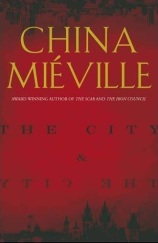 As a sci-fi fan who is always looking for new authors to pursue, I’d heard of China Miéville a while back and made a mental note to check him out. I was very pleased, therefore, to find that the latest book nominated for our book group to read was his The City & the City.
As a sci-fi fan who is always looking for new authors to pursue, I’d heard of China Miéville a while back and made a mental note to check him out. I was very pleased, therefore, to find that the latest book nominated for our book group to read was his The City & the City.
I always leave reading our book-group books till the last minute so that I can actually remember enough detail to take an active part in the discussions; so, although it’s now a week since our meeting, a great deal still remains with me. Plus it’s that kind of book.
I loved it. It’s the kind of sci-fi/fantasy that appeals to me, i.e. the story is set in what essentially appears to be our regular modern-day world but with odd things going on under the surface that suggest life isn’t quite what it seems. Miéville introduces his two cities gradually, using jargon that is particular to those worlds without explaining it, letting the meaning and the understanding seep into the reader’s brain of its own accord, as, little by little, you work out what’s going on by sheer exposure to events.
The basic premise is of two cities (Besźel and Ul Qoma) occupying the same geographical space but functioning as two separate cities. Different areas of each city are designated ‘total’ (in your home city entirely), ‘alter’ (in the other city entirely), and ‘crosshatched’ (in both cities). Citizens of each must ‘unsee’ and ‘unhear’ anyone from the other city who appears in their vicinity; to acknowledge them would be to commit ‘breach’, whereupon shadowy authoritarian figures (confusingly also named Breach) appear and carry you off to an uncertain fate.
Shades of Orwell’s ‘doublethink’ from Nineteen Eighty-Four are clearly present, but at our book group there was disagreement over whether the need to keep the two cities separate was physical or political: does breach lay the cities open to some kind of fantastical explosion of antimatter (worlds colliding, literally), or is it merely a way of controlling people, keeping them in subservience to a greater power? I personally inclined to the latter view, as part of the plot revolved around whether there was a third city hiding in the spaces between cities, controlling even Breach. There was no suggestion of impending implosions but there were many shifting allegiances, illicit conspiracies and secretive investigations.
Power play, especially that concerned with national borders, is a huge theme in this book, and Miéville draws parallels with other societies from our own world, such as the former East and West Berlin. The plot is driven by a murder mystery, but it felt to me as though this was a device on which to hang the more curious exploration of identity and personal freedom. It is perhaps not a coincidence that the woman whose murder is at the centre of the story goes by a number of names, pseudonyms and alter-egos; and the main character, the chief detective investigating the case, has himself adopted an alternative identity by the end of the book. It seems that we are being encouraged to consider the question of our own sense of self, both as individuals and in terms of the political culture or belief system we associate ourselves with.
Another key theme in this work is the suggestion (beautifully understated but nonetheless impossible to ignore) that we all regularly indulge in our own version of ‘unseeing’. Whether we are avoiding homeless people in the streets, unpleasant political decisions, or difficult aspects of our own relationships, the book presents an intelligent critique of the benefits and risks of such an approach. It is up to us how much control we choose to retain over our own lives, and Miéville does not preach but offers an insight into the consequences of different decisions. ‘Good’ people are not necessarily rewarded for their actions, ‘bad’ people do not always get their come-uppance. Despite being a fantastical setting, this is real life.
I’ve enjoyed all of the books that have come my way since joining this book group, but Miéville is the first author that I’ll actively be going out to read more of; apparently Perdido Street Station is one to look out for, so that’s next on my list. If you are a fan of intelligent adult fantasy, then please join me in my new-found excitement at having identified more great books to read, and go out and buy The City & the City for yourself.